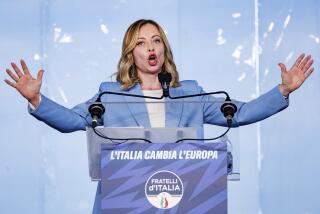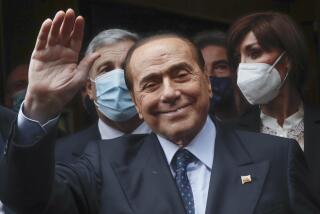Italy Prime Minister Mario Monti faces growing pressure over debt
- Share via
ROME — Italy’s record hot summer is coming to an end, but the heat will remain on Prime Minister Mario Monti in the coming weeks as he faces enacting more unpopular measures to cut the nation’s enormous debt while trying to coax its economy to grow, even if only slightly.
As Italians are easing back into workaday life after August vacations, Monti is already in full swing dealing with challenges on both the domestic and European fronts. On Wednesday, he is scheduled to meet with German Chancellor Angela Merkel in Berlin to discuss the long-running euro debt crisis and Italy’s worryingly high long-term borrowing costs.
Monti is facing pressure from Germany and other northern European countries to buckle down with austerity measures, while critics at home blast him for focusing on cost-cutting and taxes rather than growth.
In his meeting with Merkel, Monti is likely to make the case for spending measures to stimulate production and employment, and to ask Berlin to ease up on its demands that Italy and other financially troubled countries, such as Spain and Greece, slash their budgets. All three Mediterranean nations are in recession; Greece has already received two international bailouts, and there is fear that Spain and Italy may have to do the same if their borrowing rates don’t come down.
“Everything is difficult now,” said Gianfranco Pasquino, a political scientist at the Johns Hopkins University School of Advanced International Studies in Bologna, Italy. “He’s got to work with two contrasting problems: reducing spending and the deficit, and defining measures for growth.”
Monti has seen his once-high approval ratings fall as he tries to implement unpopular economic reforms, such as modifying Italy’s labor laws.
He faces increasing demands from the broad-based but uncomfortable alliance that supports him, which includes the Democratic Party on the center left and former Prime Minister Silvio Berlusconi’s People of Liberty Party on the right, as well as some small centrist parties.
Adding to the uncertainty, Berlusconi, who was forced out of office in November by a series of sex and tax scandals and Italy’s growing economic and financial emergency, has been hinting that he may try to win back his old job.
That probably doesn’t worry Monti, a professor and former European Union commissioner who was tapped by lawmakers to run Italy after Berlusconi stepped down. Monti has said repeatedly that he is not interested in making a political career after what he hopes will be the natural end of the present Parliament next spring.
But the instability generated by such speculation does make navigating the next few months more difficult, Pasquino said.
Despite Monti’s declining popularity, most people “believe he has done relatively well in responding to the country’s problems,” Pasquino said. And lawmakers are happy for him to serve as a lightning rod for criticism for policies that they know are unavoidable but that they do not want to be blamed for.
Talk of an early election this fall is diminishing, Pasquino said. If it hasn’t happened by October, it would be virtually impossible to call an early poll.
When Monti took power 10 months ago, the yield on Italian 10-year bonds surpassed 7%, a rate generally believed to be impossible for countries to pay for any length of time.
After Monti secured approval of about $25 billion in austerity measures including tax increases, pension reform and spending cuts, that rate decreased this year. But it has been creeping back up to just under 6% amid the political uncertainty and the difficulty Monti has had in passing structural reforms that the EU is calling for.
Entrenched interests in the professional guilds, fierce opposition from unions to changes in labor laws and caveats from political parties have made significant reform nearly impossible.
After a Cabinet meeting this week, Monti said his government would stay the course of reducing debt while also developing growth measures. Officials are floating the idea of “sin” taxes on alcohol, cigarettes and carbonated beverages.
Monti and key members of his government insist that Italy will not have to resort to asking for help from Europe’s emergency funds, despite speculation that Rome will eventually need some sort of relief, even if it is not technically a bailout.
Delaney is a special correspondent.
More to Read
Sign up for Essential California
The most important California stories and recommendations in your inbox every morning.
You may occasionally receive promotional content from the Los Angeles Times.










